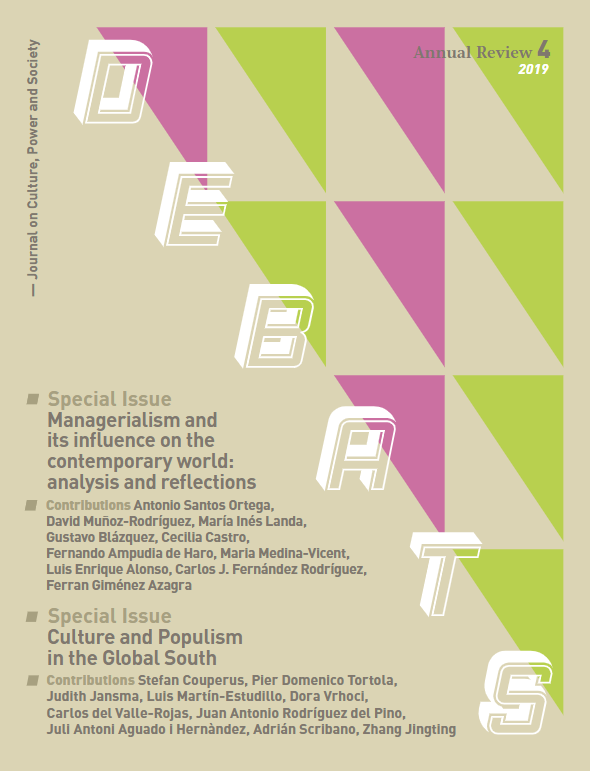Presentation of the monograph. Managerialism and its influence on the contemporary world: analysis and reflections
DOI:
https://doi.org/10.28939/iam.debats-en.2019-1Abstract
Presentation of the monograph. Managerialism
and its influence on the contemporary world: analysis and reflections
Downloads
References
Abend, G. (2014). The Moral Background: An Inquiry into the History of Business Ethics. Princeton: Princeton University Press.Alonso, L. E. (2007). La crisis de la ciudadanía laboral. Barcelona: Anthropos.
Alonso, L. E. and Fernández Rodríguez, C. J. (2006). El imaginario managerial: el discurso de la fluidez en la sociedad económica. Política y Sociedad, 43(2), 127-151.
Alonso, L. E. and Fernández Rodríguez, C. J. (2013a). Los discursos del presente. Madrid: Siglo XXI.
Alonso, L. E. and Fernández Rodríguez, C. J. (2013b). Los discursos del management: una perspectiva crítica. Lan Harremanak, 28, 42-69.
Alonso, L. E., and Fernández Rodríguez, C. J. (2018). Poder y sacrificio. Los nuevos discursos de la empresa. Madrid: Siglo XXI.
Ampudia de Haro, F. (2007). Las bridas de la conducta. Una aproximación al proceso civilizatorio español. Madrid: CIS.
Ampudia de Haro, F. (2010). El logro del éxito: la dimensión social de la literatura de autoayuda. Revista Española de Sociología, 13, 11-30.
Boltanski, L. and Chiapello, È. (2002). El nuevo espíritu del capitalismo. Madrid: Akal.
Carvajal Baeza, R. (comp.) (2013). Estudios críticos de la organización: qué son y cuál es su utilidad. Cali: Universidad del Valle.
Collins, D. (2000). Management fads and buzzwords. London: Routledge.
Collins, D. (2007). Narrating the Management Guru: In Search of Tom Peters. London: Routledge.
Du Gay, P. (1996). Consumption and Identity at Work. London: Sage. Du Gay, P. (2012). En elogio de la burocracia. Madrid: Siglo XXI.
Fernández Rodríguez, C. J. (2007a). El discurso del management: tiempo y narración.Madrid: CIS.
Fernández Rodríguez, C. J. (ed.) (2007b). Vigilar y Organizar: una introducción a los Critical Management Studies. Madrid: Siglo XXI.
Fernández Rodríguez, C. J. (2013). El gato que caza nuestros ratones: China como colección de mitologías. Papeles de relaciones ecosociales y cambio global, 115, 79-88.
Fernández Rodríguez, C. J. (2011). The Learning Environment and the Politics of Globalization – Consultants and business schools between destandardization and rhetoric, in M. Martínez Lucio (ed.). International Human Resource Management: an Employment Relations Perspective (pp. 181-200). London: Sage.
Fernández Rodríguez, C. J. (2017). Estudios críticos de la gestión: estudios culturales de los conflictos en el mundo del trabajo. Política y Sociedad, 54(1), 23-44.
Fernández Rodríguez, C. J. and Medina-Vicent, M. (2017). Los nuevos discursos del management: difusión, impactos y resistencias. Recerca: revista de pensament i analisi, 20, 7-14.
Gantman, E. (2005). Capitalism, Social Privilege and Managerial Ideologies. Aldershot: Ashgate.Gantman, E. (2011). La productividad científica argentina en Ciencias Sociales: Economía, Psicología, Sociología y Ciencia Política in CONICET (2004-2008). Revista española de documentación científica, 34(3), 408-425.
Gantman, E. and Fernández Rodríguez, C. J. (2016). Literature segmentation in management and organization studies: The case of Spanish-speaking countries (2000–2010). Research Evaluation, 25(4), 461-471.
Grey, C. and Willmott, H. (eds.) (2005). Critical Management Studies: A Reader. Oxford: Oxford University Press.
Hall, S. and Du Gay, P. (eds.) (2003). Cuestiones de identidad cultural. Buenos Aires: Amorrortu.
Hassard J. and Parker, M. (eds.) (1993). Postmodernism and Organization. London: Sage.Keune, M. and Serrano Pascual, A. (eds.) (2014). Deconstructing Flexicurity and Developing Alternative Approaches: Towards New Concepts and Approaches for Employment and Social Policy. London: Routledge.
Klikauer, T. (2015). What Is Managerialism? Critical Sociology, 41(7-8), 1103-1119.Landa, M. I. (2014). La sonrisa del éxito: figuraciones de una subjetividad exigida. Arxius de sociologia, 30, 153-168.
Landa, M. I. and Marengo, L. G. (2011). El cuerpo del trabajo en el capitalismo flexible: lógicas empresariales de gestión de energías y emociones. Cuadernos de relaciones laborales, 29 (1), 177-199.
Laval, C. and Dardot, P. (2013). La nueva razón del mundo. Ensayo sobre la sociedad neoliberal. Barcelona: Gedisa.
Lazzarato, M. (2013). La fábrica del hombre endeudado. Buenos Aires: Amorrortu.
Locke, R. R. and Spender, J. C. (2011). Confronting Managerialism: How the Business Elite and their Schools Threw our Lives out of Balance. London: Zed Books.
Medina-Vicent, M. (2018). Género y management en el marco neoliberal. Un análisis crítico para la emergencia de liderazgos feministas. Doctoral Thesis.
Moruno, J. (2015). La fábrica del emprendedor. Trabajo y política en la empresa. Madrid: Akal.
Muñoz-Rodríguez, D. and Santos Ortega, J. A. (2017). Las cárceles del capital humano: trabajo y vidas precarias en la juventud universitaria. Recerca: revista de pensament i analisi, 20, 59-78.
Parker, M. (2002). Against Management. Cambridge: Polity.Parker, M. (2018). Shut Down the Business School: What's Wrong with Management Education. London: Pluto Press.
Santos Ortega, J. A. (2014). La política en manos de los empresarios: el imparable ascenso de la ideología del emprendedor. Papeles de relaciones ecosociales y cambio global, 127, 29-43.
Downloads
Published
How to Cite
Issue
Section
License
Without prejudice to the provisions of article 52 of Spanish Law 22/1987 of November 11 on Intellectual Property, BOE (official state bulletin) of November 17, 1987, and pursuant to said legislation, the author(s) surrender(s) free of charge its rights of edition, publication, distribution and sale of the article, for its publication in Debats. Journal on Culture, Power and Society.
Debats. Journal on Culture, Power and Society is published under the Creative Commons license system in accordance with the «Recognition - Non-Commercial (by-nc) modality: The generation of derivative works is permitted provided that commercial use is not made. Nor can the original work be used for commercial purposes».
Thus, when the author submits his/her contribution, he/she explicitly accepts this assignment of publishing and publishing rights. Authors also authorize Debats. Journal on Culture, Power and Society to include their work in an issue of the journal to be distributed and sold.











